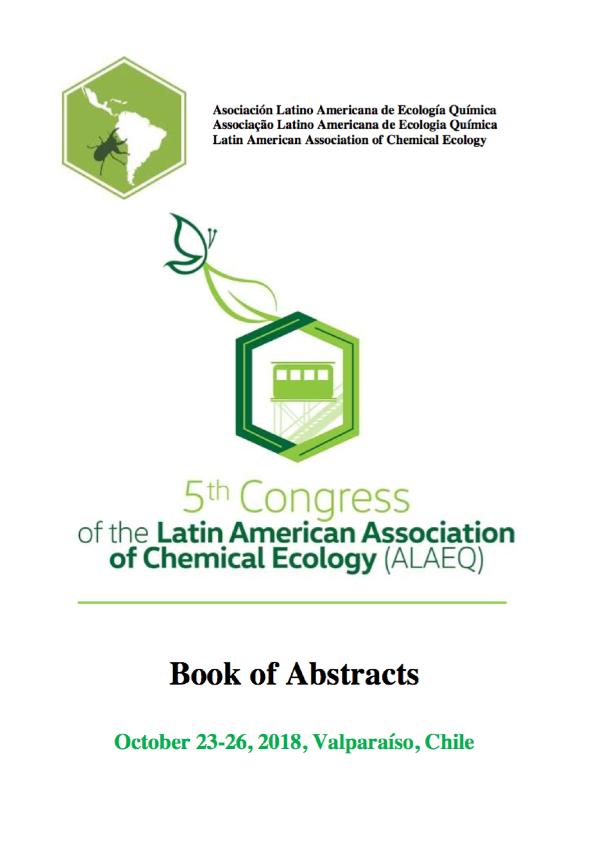Mostrar el registro sencillo del ítem
dc.contributor.author
Coll Araoz, Maria Victoria

dc.contributor.author
Fernandez, Patricia Carina

dc.contributor.author
Luft Albarracin, Erica Beatriz

dc.contributor.author
Virla, Eduardo Gabriel

dc.date.available
2023-02-13T14:44:09Z
dc.date.issued
2018
dc.identifier.citation
Maize specialist, Dalbulus maidis, induces the release of an allomone in a maize landrace, but not in maize hybrids; 5th Congress of the Latin American Association of Chemical Ecology; Valparaíso; Argentina; 2018; 1-2
dc.identifier.uri
http://hdl.handle.net/11336/187747
dc.description.abstract
Plant defenses against herbivores are predicted to change with domestication and breeding in crop plants. A decisive factor for the susceptibility or resistance of host plants is their ability to recognize a particular herbivore and mount rapid defenses, producing allomones that dissuade future individuals of the pest from feeding.In this study, we compared the attractiveness of a suite of three maize germplasms representing two domestication and breeding transitions from landrace to modern hybrid cultivar, on a specialist herbivore, the corn leafhopper Dalbulus maidis (DeLong) (Hemiptera: Cicadellidae).Two PIONNER maize hybrids, P1780YR (temperate) and P30B39HR (tropical) and a landrace known as sweet white maize (SWM) were used. Treatments consisted of Non-induced healthy maize plants and plants Induced by the attack of 6 D. maidis females (for 12 hs before the assays). Olfactory dual choice tests were performed between Non-induced and Induced plants of each germplasm, using a stationary phase olfactometer, with the odor sources placed in opposite directions (N=40). Statistical differences where determined with Chi-square goodness-of- fit test (χ2). Plant volatiles were collected and analyzed according to Braccini et al. (2015). Dalbulus maidis preferred Non-induced SWM over Induced SWM (χ2 = 10.465, P = 0.001), but did not discriminate between Induced temperate maize vs. Non-induced (χ2 = 0.615, P = 0.433), or Induced tropical maize vs. Non-induced (χ2 = 0.065, P = 0.799). Induced SWM produced an indole derivative and homoterpenes which were not produced by Induced temperate and tropical hybrids. At least one of these compounds could be an allomone, responsible for repelling D. maidis, that has been lost in the modern hybrids.
dc.format
application/pdf
dc.language.iso
eng
dc.publisher
Universidad Pontificia de Valparaíso
dc.rights
info:eu-repo/semantics/openAccess
dc.rights.uri
https://creativecommons.org/licenses/by-nc-sa/2.5/ar/
dc.subject
Olfactometry
dc.subject
Allomone
dc.subject
Domestication
dc.subject
Specialist herbivore
dc.subject.classification
Otros Tópicos Biológicos

dc.subject.classification
Ciencias Biológicas

dc.subject.classification
CIENCIAS NATURALES Y EXACTAS

dc.title
Maize specialist, Dalbulus maidis, induces the release of an allomone in a maize landrace, but not in maize hybrids
dc.type
info:eu-repo/semantics/publishedVersion
dc.type
info:eu-repo/semantics/conferenceObject
dc.type
info:ar-repo/semantics/documento de conferencia
dc.date.updated
2023-02-06T13:54:56Z
dc.journal.pagination
1-2
dc.journal.pais
Chile

dc.journal.ciudad
Valparaíso
dc.description.fil
Fil: Coll Araoz, Maria Victoria. Consejo Nacional de Investigaciones Científicas y Técnicas. Centro Científico Tecnológico Conicet - Tucumán. Planta Piloto de Procesos Industriales Microbiológicos; Argentina
dc.description.fil
Fil: Fernandez, Patricia Carina. Universidad de Buenos Aires. Facultad de Agronomía; Argentina. Instituto Nacional de Tecnología Agropecuaria. Centro Regional Buenos Aires Norte. Estación Experimental Agropecuaria Delta del Paraná; Argentina. Consejo Nacional de Investigaciones Científicas y Técnicas; Argentina
dc.description.fil
Fil: Luft Albarracin, Erica Beatriz. Consejo Nacional de Investigaciones Científicas y Técnicas. Centro Científico Tecnológico Conicet - Tucumán. Planta Piloto de Procesos Industriales Microbiológicos; Argentina
dc.description.fil
Fil: Virla, Eduardo Gabriel. Consejo Nacional de Investigaciones Científicas y Técnicas. Centro Científico Tecnológico Conicet - Tucumán. Planta Piloto de Procesos Industriales Microbiológicos; Argentina
dc.relation.alternativeid
info:eu-repo/semantics/altIdentifier/url/http://www.alaeq.org/wp-content/uploads/2018/11/Book-of-Abstract-ALAEQ-2018-FINAL.pdf
dc.conicet.rol
Autor

dc.conicet.rol
Autor

dc.conicet.rol
Autor

dc.conicet.rol
Autor

dc.coverage
Internacional
dc.type.subtype
Congreso
dc.description.nombreEvento
5th Congress of the Latin American Association of Chemical Ecology
dc.date.evento
2018-10-23
dc.description.ciudadEvento
Valparaíso
dc.description.paisEvento
Argentina

dc.type.publicacion
Book
dc.description.institucionOrganizadora
Asociación Latinoamericana de Ecología Química
dc.source.libro
Book of Abstracts: 5th Congress of the Latin American Association of Chemical Ecology
dc.date.eventoHasta
2018-10-25
dc.type
Congreso
Archivos asociados
